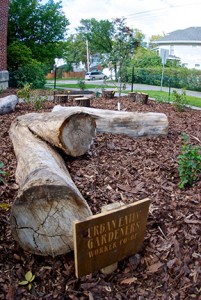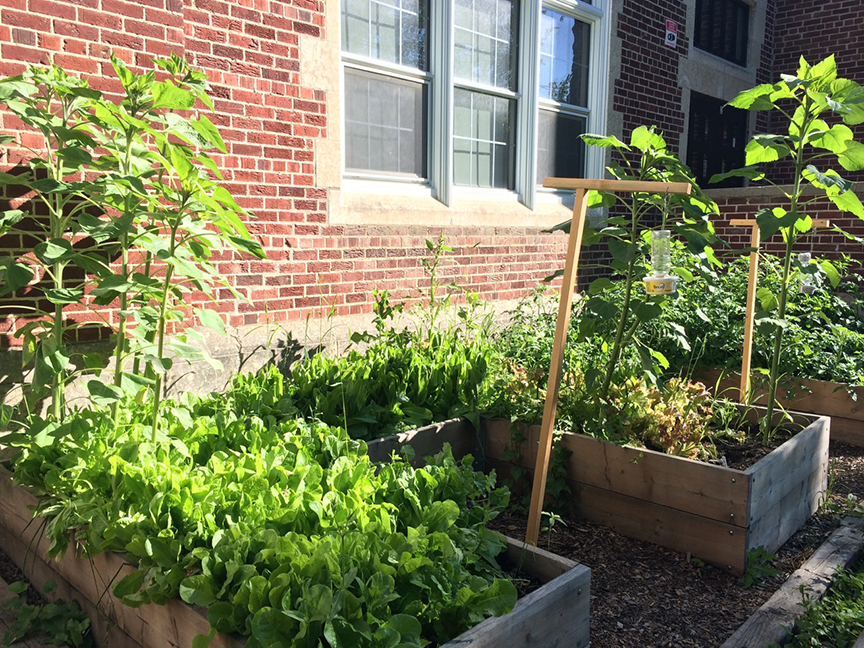Above: Eight L-shape raised beds provide lots of growing opportunity for the students of Grosvenor Elementary School, Winnipeg. Photo: Mark Klassen

It’s great to see how many people in Winnipeg want to engage youth and community in the act of growing food. We are fortunate to be able to help some of those folks in their worthy endeavours. There are many exciting ways to build a new vegetable garden, but we have found that the wooden raised bed is a simple and dependable solution – it has numerous advantages over in ground beds and does not burden most budgets. We aim to use reclaimed wood, and we fasten the corners using angle iron and nuts/bolts creating a variety of shapes. Constructing beds makes up a sizeable chunk of our work each season, although we also love projects that allow us to step outside of this familiar box.
Over the last few years, we’ve had the privilege of working with Grosvenor Elementary School to enable every classroom to plant a vegetable plot of their own. In 2013, Mark Klassen facilitated workshops with each classroom for the planning, seeding and planting of the vegetable gardens into raised beds that we constructed on the south side of their school. Next to the beds, we placed a triple compost bin made from salvaged pallet-wood, to be used for any garden waste and some of the school’s lunch waste.
The classrooms have now grown a multitude of vegetables and pollinator attractors such as lettuce, sunflowers, tomatoes, basil, bee balm, and lavender. We also facilitated a pop bottle fence garden, where the children (or parents, rather) collected bottles and hangers to install 200 herb-planted bottles on their chain link fence. Our goal this past season was to create an “outdoor classroom” near their south entrance, replacing a flat sod area with over a dozen native (including some edible) shrubs, and more noticeably two-foot diameter reclaimed (and de-barked) elm logs from Wood Anchor. Much of the sod was left on-site to create a small hill, and then covered in cardboard (biodegradable weed suppression) and wood chips. As the shrubs grow to their mature size, this area will become a small, enclosed “forest” for the children, providing a place of discovery, learning and play.
“It’s very rewarding for the children to learn about food sustainably, and the hands-on component is very engaging for the students. At recess we often see the students nibbling on the herbs trying and tasting each of them.” – Brad Corbett, past principal of Grosvenor School
Another inspiring project we were involved in during 2014 was at the NorWest Co-op Community Food Centre on Tyndall Avenue. NorWest has partnered with Community Food Centres Canada (CFCC) to create a fully programmed community kitchen in the Inkster neighbourhood, and it called for some vegetable beds in the back (among other things). Our role was to construct eight L-shaped raised beds along with four taller accessible beds, all using salvaged CN shipping crate lumber. We re-used patio stones from their front pathway to create a rear patio area, and worked with the Weston Youth Co-op to move all of the soil and wood chips.
The Abundance Community Garden is an additional example where raised beds matched the needs, providing a church in Charleswood with 18 beds to plant. Deer were a problem, so a seven foot deer fence was constructed for the whole area, with room for expansion. A compost bin, as always, was included along with a large 1000L rain barrel for watering. This barrel still has to be filled up from the distant church, but plans are in the works for a picnic shelter which will double as a rain water collector.
In 2014, we entered the National Co-op Challenge and became one of eight co-ops across Canada to receive $25,000 towards a 2015 project (view our 90-sec video at urbaneatin.com/video). With this, we are looking forward to facilitating food growing endeavours in four Winnipeg neighbourhoods – Chalmers (in Elmwood), North End, Brooklands, and Spence Neighbourhood – and we will be doing so via some new electric bikes and trailers whenever possible.
Tommy Allen
Urban Eatin’ Gardeners Worker Co-op
Manitoba Eco-Journal, Spring 2015





